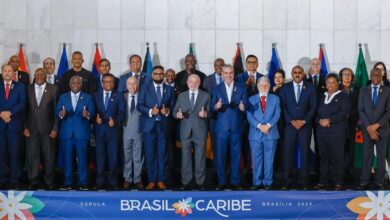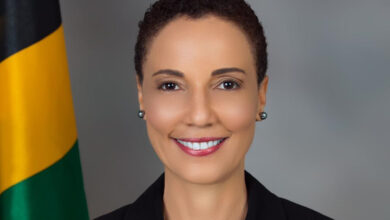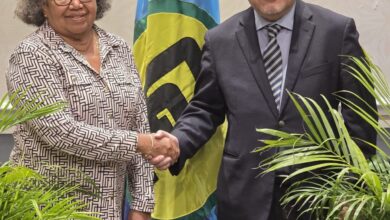The Organisation of American States (OAS) on Wednesday approved a Declaration for the swift holding of elections in Haiti, days after last ditch negotiations for a new electoral law collapsed and prompted the dissolution of Parliament.
President Michel Martelly is now ruling by decree.
Approval of the Caribbean Community (Caricom)-sponsored Declaration by the Permanent Council followed an update on the political situation in the French Creole-speaking nation by the Foreign Minister of Haiti, Duly Brutus.
The OAS said in a statement that during the meeting, the Council approved a Declaration in which the OAS expresses its support “for the constitutional Haitian authorities and all stakeholders in their commitment to hold free, fair, and inclusive elections as soon as possible in accordance with the constitutional provisions for the renewal of the democratic institutions.”
Foreign Minister Brutus, in his presentation, summarized “the evolution of the Haitian political situation with respect to the organization of legislative and municipal elections,” from the beginning of the term of President Michel Martelly in May 2011 to the present. He explained that elections for a third of the seats in the Haitian Senate, whose terms ended in January 2012, were not held “due to the difficulties connected with the constitutional amendments of 1987,” which reduced the number of Senators from 30 to 20. He noted that, despite this, the Senate decided that the quorum necessary for the functioning of the chamber would continue to be 16 (half the total of members, 30, plus one), instead of recalculating half the remaining Senators plus one (11). He said “unfortunately, this decision has allowed a minority of six Senators to systematically paralyze the workings of the Senate.”
The head of Haitian diplomacy said that, on March 19, 2014, as a result of mediation under the auspices of the Catholic Church, the El Rancho agreement was reached, which set out, among other things, “the creation of a government of openness composed of new personalities throughout the governmental apparatus.” But despite the “scrupulous respect” for the terms of the agreement shown by the executive, said Foreign Minister Brutus, “the group of six Senators decided to block all progress in the electoral process, using the ‘empty chair’ policy, thus impeding any quorum for the work sessions of the Senate.”
On December 29, 2014, continued Minister Brutus, President Martelly signed with the Presidents of the two chambers an agreement that stipulates that the legislators whose terms were ending could continue their functions until the holding of new elections, provided the Senators vote on the electoral law. Unfortunately, he added, “the six Senators preferred to allow the opportunity for understanding between Haitian brothers to pass by, choosing instead the strategy of chaos, which consists of advocating mobilization to force the resignation of the Head of State.”
The OAS Secretary General, José Miguel Insulza, reported to the Council members that given that the deadline for the Haitian Congress to pronounce on the agreements had passed, the General Secretariat joined other representatives of the international community that comprise the Core Group of countries and international agencies supporting Haiti's efforts to achieve political stability and development (United Nations, Brazil, Canada, Spain, United States, France and the European Union) – in issuing a statement that expresses the deep concern ” that the Haitian Parliament has become dysfunctional due to the fact that elections have not been held within the constitutional timeframe.”
The leader of the hemispheric institution noted that although it is not customary “to make statements on internal issues of Member Countries” this case was considered “sufficiently serious and urgent as to say a word about it.” Secretary General Insulza explained in more detail, the work the Organization has done in Haiti, especially during the last month, “to convince the different stakeholders of the need to find an agreement, the agreement they deem necessary”, and the obstacles faced o this road, “even though the President of Haiti has provided all conditions to avoid a dysfunctional parliament”.
Insulza recalled the statement of the Core Group, which “welcomes the Political Accord recently concluded between President Martelly and several opposition actors” and which, in the best interests of the nation, “encourages all parties to join the consensus through this Accord.” It also recognizes the efforts of the President and other actors “to rebuild confidence in the political process,” and calls upon all parties “to continue negotiations with the objective of forming, as a matter of urgency, a consensus Government, as well as a new Provisional Electoral Council in the spirit of Article 289 of the Constitution of the Haitian Constitution.”
Upon opening the meeting, the Chair of the Permanent Council and Permanent Representative of Suriname to the OAS, Niermala Badrising, expressed on behalf of the Council ““our deepest and most sincere condolences to the government and people of France who have endured tragic and senseless loss following the criminal acts perpetrated against the Charlie Hebdo magazine on January 7, a local kosher market on January 8 in Paris, and other tragic events.”
Before the conclusion of the meeting, the Permanent Observer of France to the OAS, Ambassador Jean-Claude Nolla, offered his words of appreciation for the messages expressed by delegations regarding the criminal act.
Similarly, during the Council meeting delegates voiced several messages of condolences to the government and people of Saint Vincent and the Grenadines for the accident that killed five people when a bus carrying children fell into the sea in the locality of Rock Gutter.
During the meeting the delegations of The Bahamas, Haiti, Ecuador, Colombia, Chile, the Dominican Republic, the United States and Canada took the floor.






